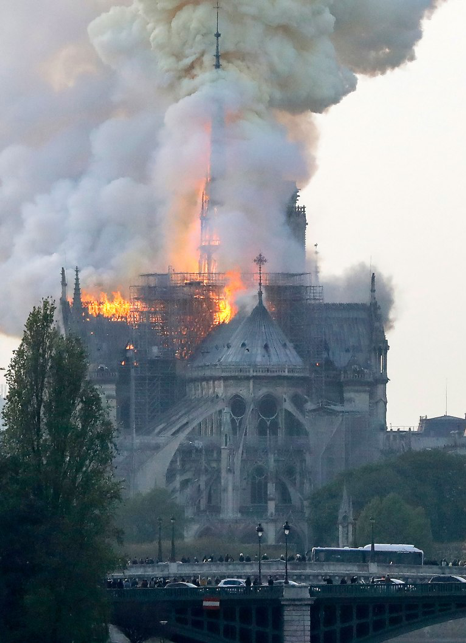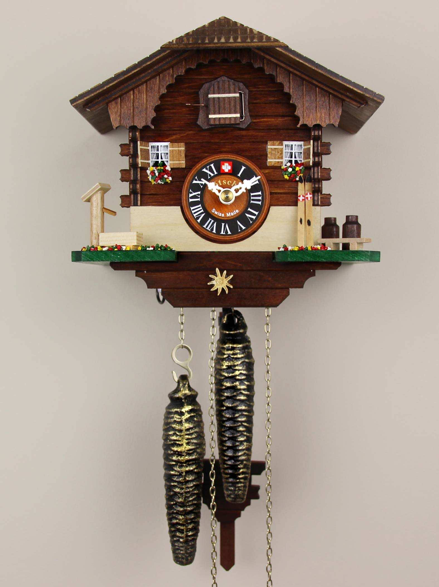
Monday’s catastrophic fire inside the cathedral of Notre-Dame de Paris, terrible as it was, might just allow us to step back from the 24-hour news cycle and reflect on the longer horizon of human history. The fire damage to this iconic structure provides us an opportunity to look at a longer horizon and set other events in perspective. There is little doubt that the church will be rebuilt and restored. Even as the embers were still glowing, President Emmanuel Macron was promising to rebuild. This is not the first time its existence has been in peril. With luck, however, it may be the last.
This astonishing monument is much more than a religious edifice. Its construction began in 1160 and was, for the most part, completed in 1260. One hundred years to build, now almost 800 years old, and while it’s a Gothic masterpiece it is also a symbol of the French nation.
For centuries, Notre-Dame was the sight of royal coronations, weddings, and funerals, of Napoleon’s investiture, and anti-Catholic looting during the 18th century’s Reign of Terror. Books and plays were set there.
Having fallen into disrepair, it was impressively restored in the mid-19thcentury, and in spite of revolutions, changes in government, two world wars, occupation by the Nazi Reich, and other upheavals it has remained a formidable symbol of the French people and their Republic. It was 600 years old when Thomas Jefferson and Benjamin Franklin became America’s first ambassadors to France.
I took this picture from a boat on the Seine when we were living in Paris four years ago. There is nothing in America that corresponds to it–no religious or government building that symbolizes the endurance and spirit of its people the way the great cathedral does as it rises above the Seine to dominate Paris.

In contrast, this morning I woke up to another chorus of “No collusion. No obstruction” from the White House lawn. It was jarring in its banality, embarrassing to be reminded that Donald Trump is still the American president. Nevertheless, the juxtaposition of the two events does offer us an opportunity for perspective.
Donald John Trump is an uninformed, un-curious, overweight, almost 73-year-old, narcissist who lives on a diet of KFC, Big Macs, and Fox News. In 10 years, it’s likely he and I will both be dead. He will be far from center stage – an asterisk, anomaly, and footnote on the greater American timeline – a tiny seeping pustule on its body politic. He’ll be gone, buried with his faux-gold trappings in some garish crypt where visitors can assess the mystery of his place in American history. Notre Dame will endure…damaged, but still standing guard over the French Republic.
Will America endure? On the timeline of history there is good news and bad news for America. The good news is that we have been protected by two great oceans, one on each side. The bad news is that we have been protected by two great oceans, one on each side.
For most of our 243 years, the Atlantic and Pacific oceans, were natural barriers that kept us safe from foreign invasion. Until recently, they gave us time and space to react to foreign threats and keep us isolated from immediate physical harm. We were perfectly situated to protect ourselves while staying connected to the broader world. Jefferson and Franklin traveled to Europe in order to maintain the connection to our European roots and establish alliances for our mutual benefit. Donald Trump is trying for some undetermined reason to undermine those established alliances. In today’s world, it is not enough to have natural barriers. Missiles and cyber-invasion are threats that are not impeded by topography. Diplomacy and personal relationships are more important than ever.
I ask myself repeatedly how Trump, an American child of wealth and privilege, could have passed up the opportunity to travel and learn about the world? How could he have chosen life inside the insular New York bubble when there was so much more outside? How could a man so lacking in curiosity, so embarrassingly ignorant of world politics and geography, become president of the United States? Why did American voters choose a president more interested in personal wealth than their own welfare.
I am reminded of a vignette in Graham Greene’s The Third Man where one of the characters riffs on history by saying that in 3000 years the Italians have seen the rise and fall of the Etruscan and Roman civilizations, Christianity, the Black Plague, the Renaissance and Reformation, endless regional battles, and two world wars while in the same 3000 years, without confronting a major problem, Switzerland’s singular achievement is the cuckoo clock. Donald Trump is our cuckoo clock—limited in almost every way – intelligence, emotional IQ, world experience, taste, empathy, and generosity despite his immense privilege.

The fire at Notre-Dame is a catastrophe of almost unimaginable proportions but thankfully only temporary. It will be rebuilt, restored and reclaim its stature as a secular pilgrimage site and religious monument. Donald Trump’s expiration date is fast approaching. It is probable that he will be a one-term president, cast aside in 2020 and in time, through the lens of history, be regarded as the most dangerous and incompetent person ever to hold that high office.
The Paris fire allows us to gain historical perspective on the importance of people and events. Notre-Dame is immensely important. Donald Trump is a momentary aberration and singularly unimportant in the big picture.
As Parisians gathered to watch the conflagration yesterday, to sing hymns and kneel in prayer, I listened to an international correspondent describe the scene from the courtyard of Shakespeare and Company, one of the world’s great English-language bookstores. Four years ago, during an extended stay in Paris, Marilynn and I spent time rooting around in Sylvia Beach’s small rooms talking about books. Think what a different world we might have if Donald Trump, with all his wealth and privilege, had at an early age decided to learn about the world and root around in Shakespeare and Company.
































